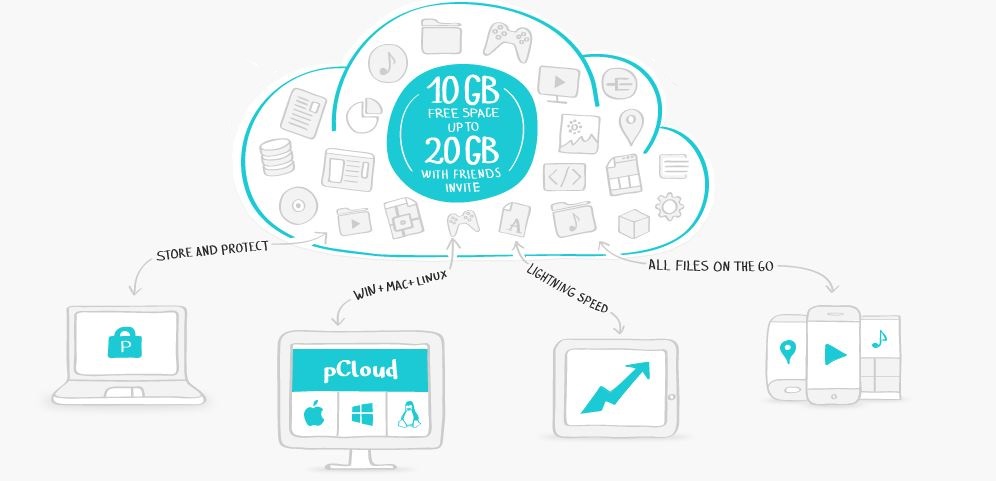pCloud: Yet Another Cloud Storage Company, in Bulgaria
With few unique features. Enough to make the switch?
By Corentin Béchade | January 20, 2014 at 2:59 pmSaying that the cloud storage market is crowded is an understatement with more than 2,200 firms already in this field in the world.
With our growing mobile lifestyle every company now has to offer some kind of cloud storage solution of its own. While some big players in the market like Amazon, Google or Dropbox have enough momentum to attract customers, other ones struggle to get brand recognition, mainly due to the complexity of differentiating feature-wise one service from the other. pCloud is part of this group.
pCloud is a fairly new service, having been live since September 2013. The solution is managed by pCloud Ltd, a Bulgarian company that aims to build a “better new model that makes the existing one outdated.” To do so, it took some of the pages of the leading cloud storage services and added a few twist here and there to make the service stand out.
-
It accepts Bitcoin payment: For all the crypto-currency enthusiasts, pCloud premium plans can be paid in Bitcoin. The company is apparently the first cloud service to accept the this digital currency for payments. With no credit cards number attached, the paying process is a little bit more anonymous. But with a currency as volatile as Bitcoin, the company is taking a financial risk in case Bitcoin collapses.
-
Social media backup: pCloud can backup all the photos and videos of social media sites like Facebook, Instagram or Picasa (now Google+ Photos). If something wrong happens to your social network account, you will at least still have a remote backup of your photos and videos. The service also offer a WordPressbackupplugin for your site or blog.
-
Unique upload links: The service allows you to create an upload link address to give to people for easy file sending. Whether or not the person is a pCloud member makes no difference. The upload links goes to a web interface from which people can drop files into your cloud storage account.
Despite those unique features, the service is otherwise pretty standard and does no better than competing ones:
-
Free Storage: On the free storage side of things, pCloud offer 10GB to all users, considerably more than the 2GB of Drobox or 7GB of Skydrive space but less than what Google Drive offering, 15GB.
-
Paid plans: pCloud offers some paid plans, but it is again not exactly unheard of. You can have 100GB, 300GB or 1TB for $4.99, $14.99 or $49.99 respectively.
-
The 100GB plan is less expensive than Dropbox, but is essentially the same price than Google Drive or Skydrive.
-
The 300GB plan is alone in its category, most cloud storage service either offer 200GB or 400GB options. The pricing are similar comparatively.
-
The 1TB plan is at the same price than Google Drive.
-
And while pCloud has only 3 offerings, Google Drive and Dropbox offer more space and more granular choices.
-
-
Mobile app: pCloud only has Android and iOS app while most of the competing companies have at least a Windows Phone App and sometimes even Blackberry App.
-
Desktop software: Like all major cloud service companies, pCloud offer a desktop software to install which creates a remote folder in your file explorer. Google Drive, Dropbox are in the same situation and Skydrive has the advantage of being integrated into all Windows 8/8.1 computers.
While pCloud offers some interesting feature, most of them are equal or even inferior to what other companies offer. The location of the servers could have been a differentiating feature, since more and more consumer do not trust U.S companies to handle their data following the NSA panic, but after reaching out to the company, we were told that the servers were located in the U.S .
pCloud is only one of the numerous cloud storage service among others and it doesn’t have the consumer-facing exposition of the bigger services, it will therefore probably attract only a niche market.
Furthermore, it will be hazardeous to give your data to a Bulgarian company that does not indicate on its web site minimum information like its address, phone number, or the names of any of its executives. Data are stored in USA but we don’t know where and by which company.














 Subscribe to our free daily newsletter
Subscribe to our free daily newsletter

